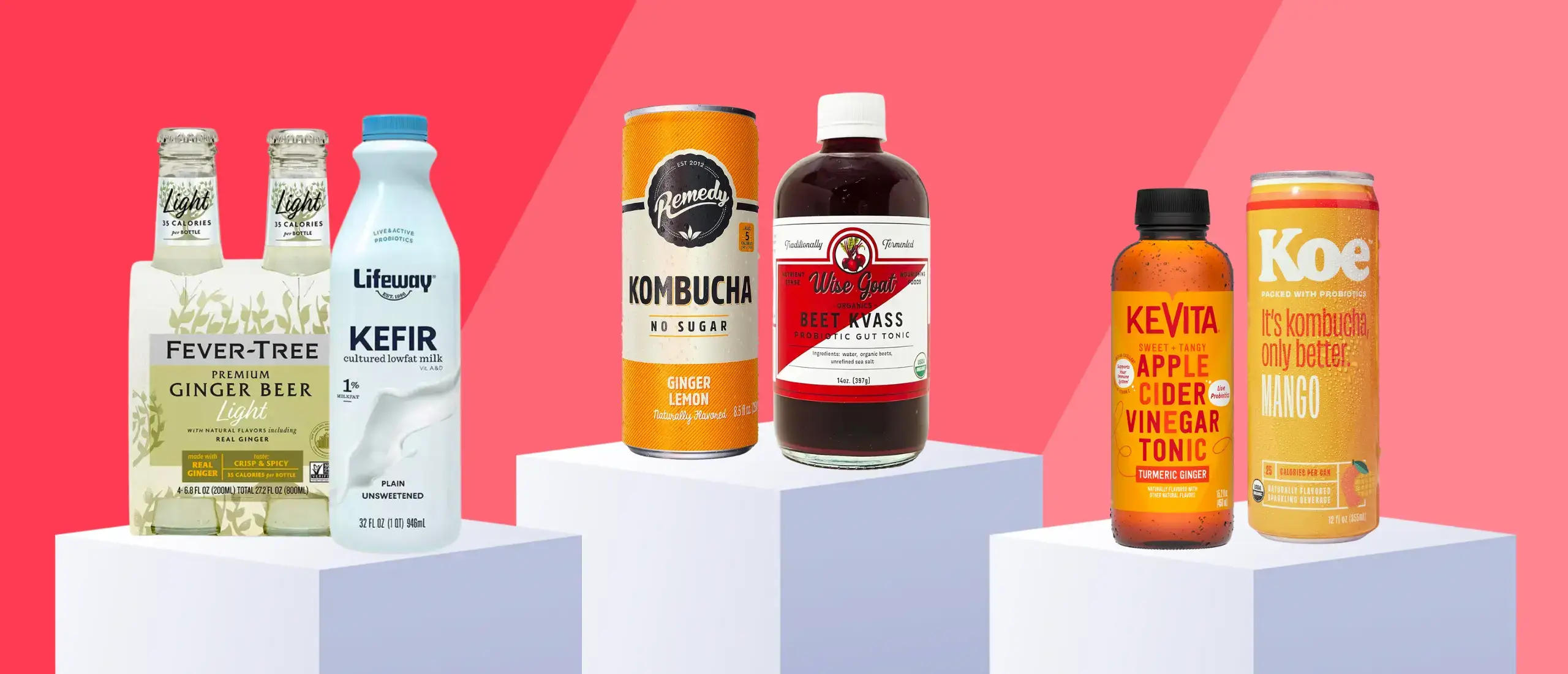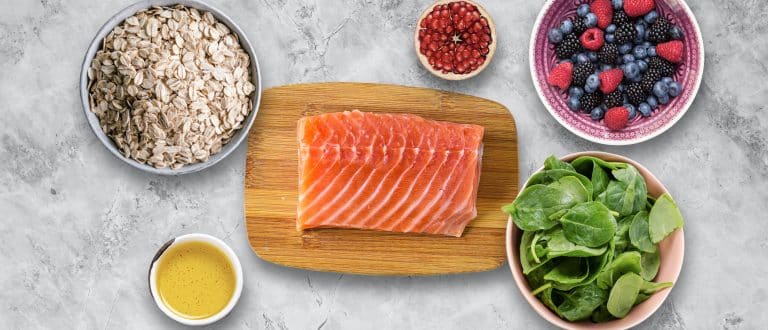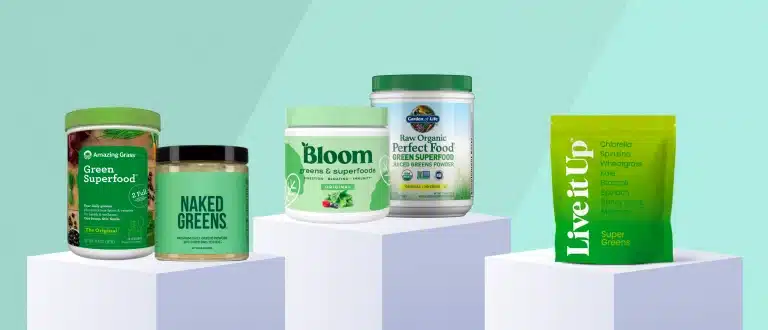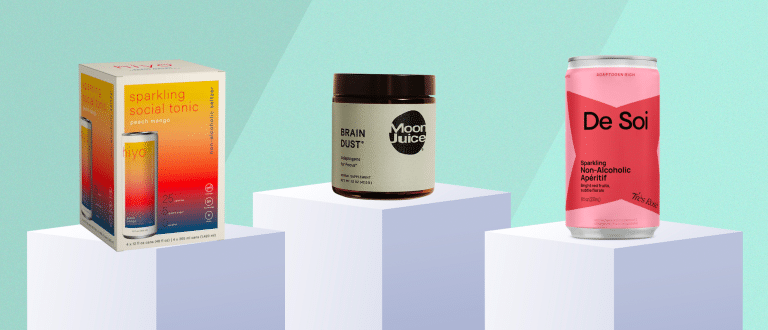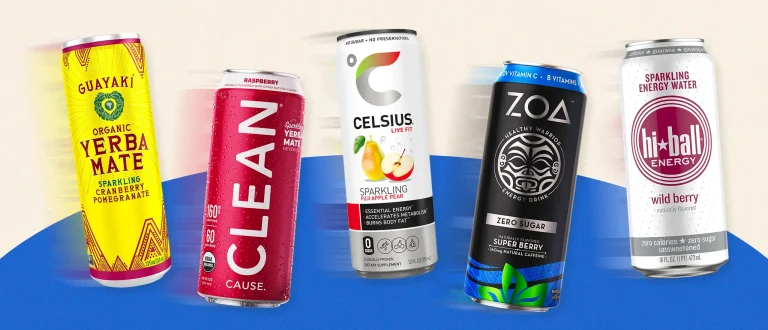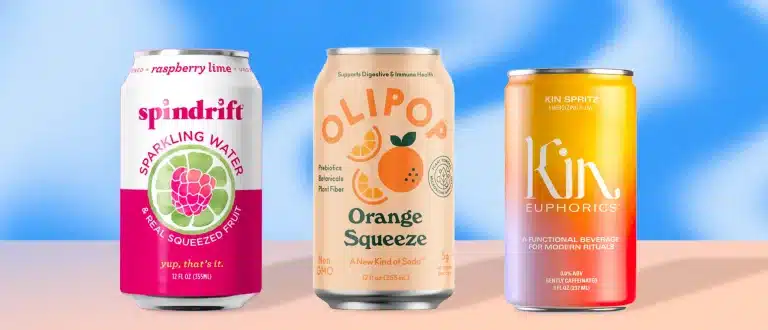6 Fermented Drinks That Boost Gut Health, According to a Registered Dietitian
- By Matthew Kadey, M.S., R.D.
- November 14, 2023
Your gut microbiome—the trillions-strong community of bacteria in your digestive tract—has a huge impact on your overall health, not just digestion. It’s been linked to everything from brain health and weight loss, to heart health and athletic performance (1, 2, 3, 4). But stress, lack of sleep, and even taking antibiotics can contribute to an unbalanced gut, tanking your everyday health.
If you’re on a quest to keep your gut microbiome in check, you probably already know eating gut-healing foods like fiber-rich fruits and veggies, getting your daily dose of probiotics, and stocking up on fermented foods like yogurt and kimchi can help. But have you tried fermented drinks?
Fermented drinks, like kombucha and kefir, promise to help get your gut right while providing a hit of hydration with each satisfying sip. But do they actually boost gut health? We popped the top on the most popular gut-boosting fermented beverages to find out.
What Are Fermented Drinks?
Fermented drinks like kombucha, ginger beer, kvass, and kefir are exactly how they sound: drinks that have gone through the fermentation process. Drink fermentation is typically kickstarted by adding organisms like bacteria, yeast, or mold—which feed off the sugar in the liquid, converting them to gas or alcohol in the process. These byproducts lend fermented drinks their distinctly tart flavor and a bounty of microorganisms.
Fermented drinks are distinct from the recent influx of probiotic sodas and sparkling waters lining grocery store shelves. With these beverages, the microorganisms are added after the drink is produced—meaning they aren’t actually fermented. Popular non-fermented probiotic beverages, like Poppi and Olipop, may still offer benefits; but, they don’t contain the same beneficial compounds found in fermented drinks.
Are Fermented Drinks Good For You?
In general, yes. But it depends on the fermented drink. Here’s what to look out for:
Can boost microbiome diversity
Fermented drinks are a good way to introduce more beneficial probiotics into your system. One study found that a diet high in fermented foods (including kombucha and kefir) can increase gut microbiome diversity and decrease markers of inflammation (5). Others have shown that kombucha and kefir may also boost your immune system (6).
That said, one to two fermented drinks a week might not be enough to make a noticeable difference in your microbiome. There’s also a chance the strains of microorganisms in a given fermented drink aren’t the ones you need most. There are countless strains of probiotics out there, and unlocking the needs of individual microbiomes is still a work in progress.
Think of fermented drinks as a complement to a more complete approach to healing your gut that involves eating plenty of fiber from whole foods, limiting processed foods, and supporting your gut with a range of probiotics, prebiotics, and postbiotics.
Can be high in sugar
Many fermented drinks are also packed with sugar. Take Health Ade kombucha for example. The American Heart Association recommends men consume no more than 38 grams of sugar per day (7), yet a bottle of Health Ade Pink Lady Apple Kombucha will knock out 16 grams in one hit.
Added sugar—especially from sugar-sweetened beverages—is a major contributor to obesity (8). Excess sugar intake may also have adverse effects on the gut microbial ecosystem (9). To avoid doing your gut a disservice, look for fermented drink options that have no or low added sugar.
The Healthiest Fermented Drinks
Want to drink your way to a more balanced gut microbiome? Here are the healthiest (and tastiest) fermented drinks for the job.
Kombucha
Kombucha is a refreshing fermented tea made by combining brewed tea with a SCOBY—a symbiotic culture of bacteria and yeast, sometimes called a “mother”—and some sugar. Over a week or two, the microbes eat the sugar, and the drink ferments into the perfect blend of tang, sweetness, and fizz (10). Because the microbes feed off the sugar, unsweetened kombucha has little if any sugar once fermented. However, most kombucha brands include added sugar and other flavors like hibiscus, ginger, or lime to complement its tart flavor.
In addition to beneficial probiotics, kombucha made from black, green, and rooibos tea has been shown to be a good source of antioxidants—plant chemicals that can help prevent or delay cell damage that may have unique gut health benefits (11). A recent review suggests that when polyphenols are broken down by microorganisms in our gut, they produce important compounds that can go on to have a positive impact on gut, immune, and brain functioning (12).
Kefir
Kefir is a dairy probiotic star. It’s easier for some people to digest than other forms of dairy, since the bacteria added to kefir during the fermentation process feed on lactose. Upon first taste, you’ll notice kefir has more tang than regular yogurt. That punchy flavor is thanks to the greater overall population of microorganisms in kefir, including the beneficial Lactobacilli species—which has been shown to reinforce your intestinal barrier (13).
The benefits of kefir don’t stop at your gut, numerous studies have confirmed its anti-microbial, anti-inflammatory, and anti-diabetic properties. A recent review concluded that kefir might also improve glycemic control (14). As with other dairy products, kefir is a good source of protein, calcium, vitamin K2, and vitamin D which work together to boost bone health.
Drinking Vinegars
Don’t worry, drinking vinegar is not nearly as bracing as it sounds. Most drinking vinegar brands dilute and blend apple cider vinegar with ingredients like fruit juice, turmeric, ginger, cayenne, and sweeteners including stevia extract and maple syrup—which makes for a surprisingly sippable concoction. It’s worth noting, although apple cider vinegar is a solid source of probiotics, it’s typically consumed in smaller amounts than other fermented drinks; and thus, may not provide the same dose of probiotics.
That said, even small amounts of apple cider vinegar have been found to have a positive impact on human health. A recent review concluded that apple cider vinegar can reduce various cardiometabolic risk factors including improved fasting blood glucose, HbA1c, and triglyceride levels (15). Another study found that consuming bread with vinegar can reduce blood glucose response and boost satiety when compared to eating bread alone (16). Maintaining steady blood sugar levels is key for optimizing mood and energy, and fending off cravings.
Ginger Beer
The origins of ginger ale all started with ginger beer—which is a much healthier drink than the modern-day sugary soda. This robust, spicy, non-alcoholic beverage is made with a blend of ginger, water, and sugar that’s fermented with yeast, then carbonated and bottled. A true ginger beer is fermented with microbes, unlike a ginger ale that’s simply carbonated, not fermented (and therefore, doesn’t contain any beneficial microorganisms). Make sure the label says ‘ginger beer’ so you know you’re getting the good stuff and not liquid candy.
Kvass
Consider kvass kombucha’s long-lost cousin. The main ingredient of kvass is traditional stale sourdough bread (a fermented staple of the Blue Zones)—which is soaked in water, yeast, and sometimes other ingredients for more flavor. The mixture ferments for a few days, and the result shares the same fizzy texture and tartness as kombucha. Ruby red beets are a common sub for bread which results in a more vibrant drink, and a load of antioxidants to boot. But both styles of the drink pack an impressive probiotic content.
Water Kefir
Not to be confused with dairy-based kefir, water kefir is produced by fermenting sugar with special water kefir grains for 24 to 48 hours in water. The result is a dairy-free, probiotic-rich beverage with less tang than your average kombucha or kefir. Water kefir is a solid option if you simply can’t stand the stronger taste of most fermented drinks, are lactose-intolerant, or follow a plant-based diet. Bonus: Water kefir is a cinch to make at home. All you need is sugar water, water kefir grains, and a little time.
References
1. Labarre, A. et al. (2022). Fatty Acids Derived From the Probiotic Lacticaseibacillus rhamnosus HA-114 Suppress Age-Dependent Neurogeneration.
2. Shoaie, S. et al. (2015). Quantifying Diet-Induced Metabolic Changes of the Human Gut Microbiome.
3. Rahman, M. et al. (2022). The Gut Microbiota (Microbiome) in Cardiovascular Disease and Its Therapeutic Regulation.
4. O’Brien, M. et al. (2022). The Athlete Gut Microbiome and its Relevance to Health and Performance: A Review.
5. Wastyk, H. et al. (2021). Gut-Microbiota-Targeted Diets Modulate Human Immune Status.
6. Chong, A. et al. (2023). Fermented Beverage Benefits: A Comprehensive Review and Comparison of Kombucha and Kefir Microbiome.
7. American Heart Association (2023). How Much Sugar Is Too Much?
8. Faruque, S. et al. (2020). The Dose Makes the Poison: Sugar and Obesity in the United States—A Review.
9. Garcia, K. et al. (2022). Impact of Dietary Sugars on Gut Microbiota and Metabolic Health.
10. Villarreal-Soto, S. et al. (2018). Understanding Kombucha Tea Fermentation: A Review.
11. Gaggia, F. et al. (2018). Kombucha Beverage from Green, Black, and Rooibos Teas: A Comparative Study Looking at Microbiology, Chemistry, and Antioxidant Activity.
12. Wan, M. et al. (2021). Dietary Polyphenol Impact on Gut Health and Microbiota.
13. Dempsey, E. et al. (2022). Lactobacillus spp. for Gastrointestinal Health: Current and Future Perspectives.
14. Salari, A. et al. (2021). Effect of Kefir Beverage Consumption on Glycemic Control: A Systematic Review and Meta-Analysis of Randomized Controlled Clinical Trials.
15. Tehrani, S. et al. (2023). The Effects of Apple Cider Vinegar on Cardiometabolic Risk Factors: A Systematic Review and Meta-Analysis of Clinical Trials.
16. Ostman, E. et al. (2005). Vinegar Supplementation Lowers Glucose and Insulin Responses and Increases Satiety After a Bread Meal in Healthy Subjects.



